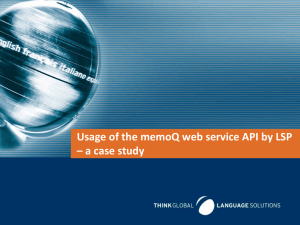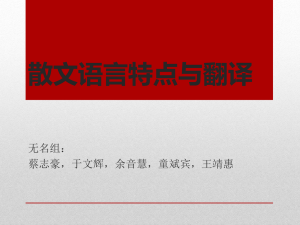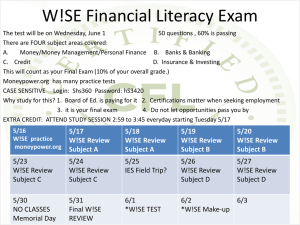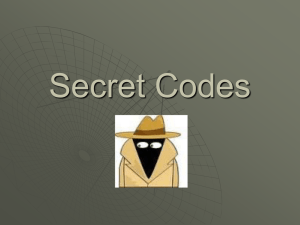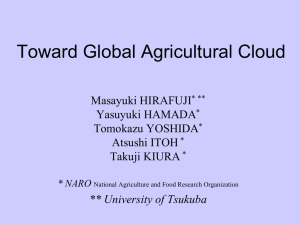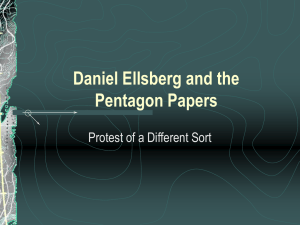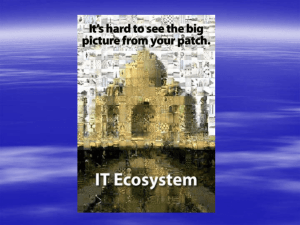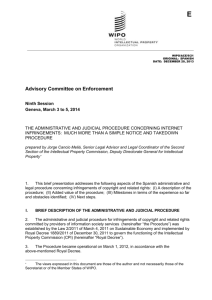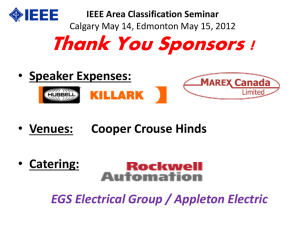Copyrights for Software and Websites
advertisement
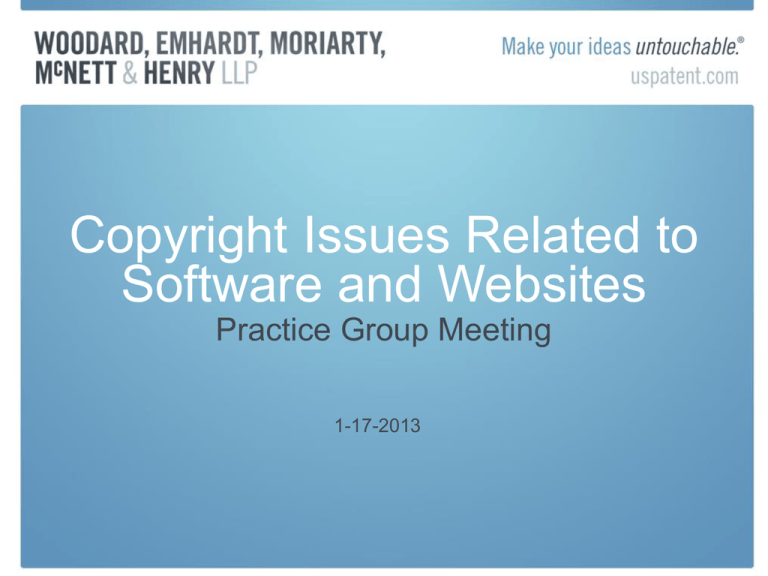
Copyright Issues Related to
Software and Websites
Practice Group Meeting
1-17-2013
Copyright: Protecting Expression
• “Works of authorship fixed in a tangible medium of
expression”
• Software
– What is protectable? Just the code?
– How is it protected? Do I have to deposit my secret code?
– Is an algorithm “expressive” in some way? Or is it just a
method for doing something?
– What about my APIs? Can I protect those?
• Internet/Websites:
– What is protectable?
– How is a page changing every day protected under rules
written for books that never change?
– Digital explosion = lots of copying! What protection can I
get?
– What about social media?
Software Copyright: Source Code
• Can register as literary work
– Update registration with new versions
– However: Copyright is an automatic right
Acquired upon fixation
Do not need to register to hold a copyright
However: MUST register to sue for infringement
Software Copyright: Source Code
• What if code contains trade secrets?
• Options:
– Deposit only object code: Registration issues
under “rule of doubt” = benefit of doubt being
unable to verify copyrightable authorship
– Deposit sections of the source code blocked out
Software Copyright: Hiding Code
• First 25 and last 25 pages of source code with
portions containing trade secrets blocked out, or
• First 10 and last 10 pages of source code alone, with
no blocked out portions, or
• First 25 and last 25 pages of object code plus any 10
or more consecutive pages of source code, with no
blocked out portions, or
• For programs 50 pages or less in length, entire
source code with trade secret portions blocked out
• However:
– Blocked out portions must be proportionately less than
the material remaining; and
– Visible portion must represent an appreciable amount of
original computer code.
Software Copyright: Substantial Similarity
• Deposit used in “substantial similarity”
analysis
• Choose carefully: Deposit enough to prove
infringement later without giving up the secret
• Example from trade secret world:
– Obfuscate the images
– Show enough to show substantial similarity
– Hide enough to preserve the secret
• Must indicate by cover letter (software) or
petition (trade secret)
Trade Secret Deposit Example: As Authored
Note: This is Fig. 14 from issued
U.S. Patent 8,000,000
Trade Secret Deposit Example: As Filed
Note: This is Fig. 14 from issued
U.S. Patent 8,000,000
Software Copyright: More than Source Code
• Cannot copyright functional aspects
• Possibly patentable as e.g. a process, system
and method for performing a process, etc.
• Protection may be available for “structure,
sequence and organization”
– Protection even if infringer wrote in another
language/platform
– Things not necessary to the utilitarian function
might be considered protectable expression
– E.g. file structures, screen outputs, data input
formats, flow/sequencing of screens.
– Especially if there is more than one way to
achieve the same result.
Application Programming Interfaces?
• Oracle v. Google NDCA case says no
copyright
• Google copied structure and names of 37
packages from Oracle’s Java API into the
Android platform
• Key issue: Whether the API specification is
protected, not the implementation
Example Java API and Method
• API defines a library of method (function) calls:
public boolean java.lang.String.startsWith(String prefix, int
offset)
• Source code for a particular implementation of
the method (function) determines how the
computer behaves when the method is called:
public boolean startsWith(String prefix, int toffset) {
char ta[] = value;
int to = offset + toffset;
char pa[] = prefix.value;
. . . .
return false;
}
}
return true;
}
Software API’s: Judge’s Ruling
• Judge relied on these points of law:
– If there is only one way to express it, then no
one can claim ownership by copyright (merger
doctrine)
– Names and short phrases not copyrightable
– No protection for ideas, procedures, systems,
methods of operation or concepts
– Don’t get protection just because you worked
hard to produce it
Software APIs: Judge’s Ruling
• Not Protected: Method specification defined in
the API = idea
• Protected: Actual code in methods as
implemented by Oracle, Google, or anyone
else = expression
• To be interoperable across platforms, the API
must match exactly
• Only one way to express the idea of having a
Java API
• Therefore API is not protected: Anyone can
write their own implementation
• Appeals in progress. . .
Software Copyright: User Interfaces
• Copyright Office: Single registration can
protect programs and related screen displays
– Don’t need a separate registration for screen
displays
– Don’t need a specific reference to them in the
application
– Includes video games!
• NOT true for websites! More later. . .
• Courts: Set of UI operations alone not
copyrightable
– Must indicate specific infringing elements
Software Copyright Ownership
• First sale doctrine: Owners of copies have the
right to resell their copy . . .
• Software copies are rarely “sold”
• Software copies are “licensed” for use
• Additional copies may be made
– For archival purposes “as an essential step in
the utilization of the computer program”
– For maintenance purposes
• Fair use: Some copying/distribution of
protected elements may be allowed – but fact
sensitive!
Open Source and “Copyleft”
• Copyright law not just a constraint on copying
• Protects right to maintain free distribution
• Sometimes referred to as “Copyleft” licensing
• Best example: GNU General Public License
• Common in Open Source Software Projects
• Various Permutations: You can copy and
distribute as long as you allow others to.
Websites: Special Kind of Software+
• Similar protectable elements: text, images,
audio files, movies (including any sounds).
• Unique problems:
– Digital = Easy to copy/distribute
– Web = Must copy to distribute and very fast!
– Users/Consumers = Billions in blink of an eye
– Providers = Who has rights?
– Registering = Web sites change . . .
Website Protection
• Registration:
– As with any other copyright, registration is not
required to retain rights.
– Is required to sue for infringement
– Website source code like other software
protected as a literary work and can be
registered
• Marking:
– Websites commonly marked with a copyright
notice
– Mark source as well
Website Registration
• Can register the HTML, CSS, Javascript, and other
source code like any other literary work.
• Appearance: Registering only the code is not
enough! (Not like other software)
– Registering code (like HTML) that formats text and
graphics on the screen when a website is viewed does
not cover the appearance of the generated page.
– Registration must include any website content generated
by the program source
– Not included in the submitted material received or not
referred to in the application = not registered!
– Must reregister page renditions if they change.(!)
From Books to Bytes: Not just Software
• Digital content + WWW = Easy distribution
• LOTS of copying, some necessary: Routers,
firewalls, ISPs, search engines, etc.
• DMCA limits liability of online service providers
relating to:
– Transitory digital network communications
– System caching
– Information residing on systems or networks at
user direction
– Search engines
What Providers Must Do
• Adopt policies for terminating accounts of
repeat infringers
• Agree to remove or block access to content
upon receiving notice of alleged infringement
from the copyright owner
• Make these policies publicly available
• Provide contact information on the website
and to the copyright office for a designated
agent to handle these matters
What Copyright Holders Must Do
• Monitor websites for infringing content and
report it to the designated agent for takedown
• This presents a few challenges:
– 48 hours of video are uploaded to YouTube
every minute. . .
– About 185,000,000 active websites in the world
today . . .
– About 630,000,000 hostnames . . .
– No international copyright law: Removing
infringing material from a foreign server can be
hard
Social Media (Lite)
• Terms and Conditions:
– You get to post content
– Host often takes a nonexclusive license in
anything posted: Best not to create poetry on
your friend’s blog. . .
– Has right to filter/block access/take down
infringing material
• Tests the limits of fair use:
– E.g. Playing music in the background of an
online home movie not fair use
– Like to share: Not just sharing with friends! It’s a
a very big world!

